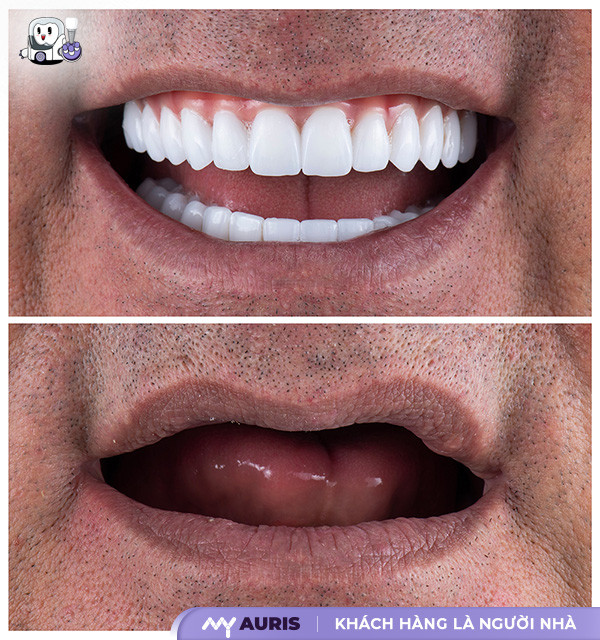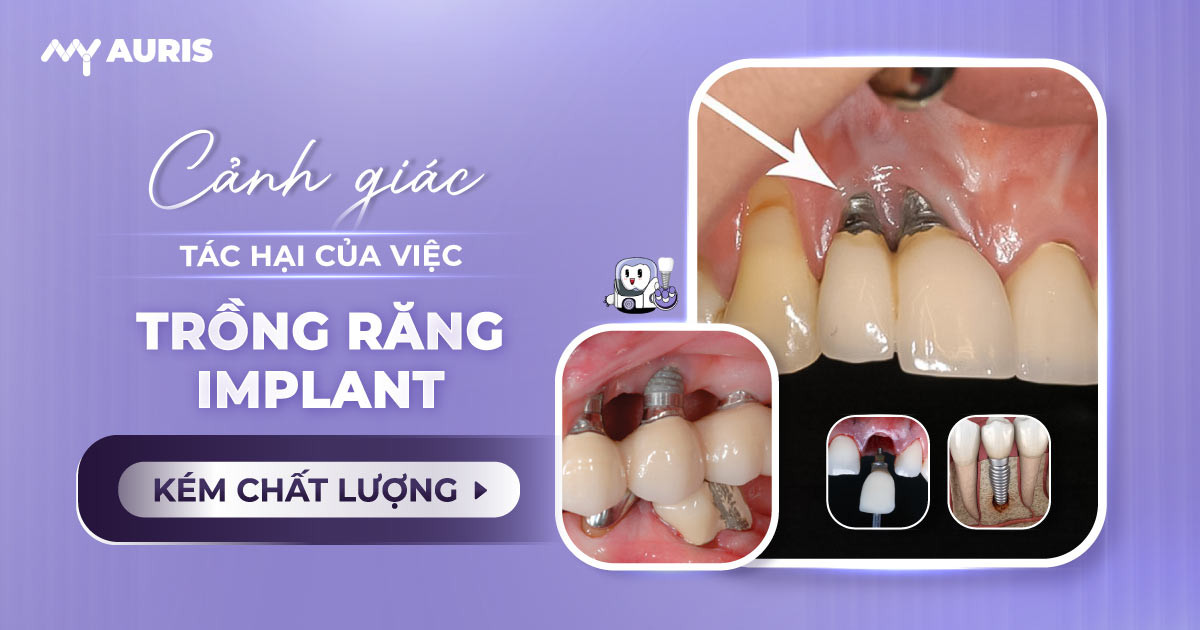Implant placement ensures safety and has few complications, posing no health risks if performed at a reputable dental clinic with a team of highly skilled doctors. With modern dental methods, the process is tightly controlled from examination, surgery, to proper hygiene after implantation, providing comprehensive results in both chewing function and aesthetics.
Conversely, poor-quality dental implant procedures carry many potential harms to oral health. Some common complications include infection, bad breath, prolonged pain, jawbone loss, loose teeth, gum inflammation, and bleeding gums. In severe cases, patients may experience impaired chewing function, or even implant rejection, causing serious damage to the surrounding tissues and jawbone.
Therefore, before deciding on implant placement, patients need to undergo a thorough examination, choose a reputable dental clinic with modern equipment and specialized doctors, and strictly follow post-operative care instructions to ensure long-term effectiveness and absolute safety.
Detailed Information on Dental Implant Techniques
Dental implant placement is currently considered the leading modern dental restoration technique. This method involves surgically placing artificial tooth roots directly into the patient’s jawbone, thereby securing the prosthetic crown above to comprehensively, safely, and sustainably restore missing teeth.
Before analyzing the pros and cons, it’s essential to understand the structure of a dental implant, which comprises three main parts: the implant post, the abutment, and the crown. The implant post, made from titanium, boasts high biocompatibility, ensuring safety within the oral cavity. It serves to replace the lost tooth root and support the crown above. The price of the implant post varies depending on its country of origin, allowing users to choose according to their needs and suitable cost.
The dental crown is designed from alloy or dental ceramic, featuring a hollow design to cover the implant post and abutment. Thanks to the meticulous design of the crown in terms of both shape and color, it can easily be mistaken for a natural tooth if not closely examined. The connection between the implant post and the crown is the abutment, which boasts high durability and longevity, ensuring the tooth is stable and lasts for a long time.
The “fixed” implant placement method is often indicated by dentists in the following recommended cases for dental implant placement:
- Individuals with missing teeth who desire fixed restorations without invading or grinding adjacent natural teeth.
- Individuals with missing teeth at risk of jawbone resorption, requiring timely intervention to preserve facial structure.
- Individuals with multiple missing teeth who have found removable dentures ineffective and wish to restore more stable chewing function.

Is Dental Implant Placement Dangerous?
Dental implant placement is a safe restorative dental method, widely regarded by many experts as having few dangerous complications if performed correctly and at a reputable dental clinic. When choosing the right facility with skilled doctors and maintaining proper hygiene after implantation, this method effectively restores missing teeth, providing high functional and aesthetic benefits for patients with permanent tooth loss.
However, complications during implant placement can still occur if the following four factors are not ensured:
The Implant Placement Doctor
The doctor performing the implant placement directly determines the success of the implant case. If the doctor lacks expertise or experience, it can easily lead to incorrect diagnosis of the patient’s condition, resulting in an inaccurate treatment plan.
To ensure safety, patients should choose a dental clinic with highly qualified doctors who have many years of experience and possess an Implant placement license issued by the Department of Health. Currently, in Vietnam, the number of adequately qualified and licensed doctors is still quite small.
Errors by less skilled doctors can lead to serious complications such as:
- Implant post placed incorrectly or misaligned
- Implant post fracture
- Implant post compressing a nerve, causing lip numbness
- High risk of infection
- Implant post rejection after placement
All these complications not only affect health but also incur significant costs for re-treatment.
Implant Post Quality
The implant post must be made of pure Titanium to ensure durability, good load-bearing and heat resistance, and high biocompatibility with bone, without harming the human body.
Currently, there are many types of implant posts of unknown origin on the market. Choosing a dental clinic that uses genuine implant posts is imperative. Avoid being tempted by cheap dental implant offers that could compromise your health.
Some high-quality implant posts recommended by the International Congress of Oral Implantologists (ICOI) include:
Straumann SLActive Implant (Switzerland), Nobel Biocare Implant (Sweden), Mis C1 Implant (Germany/Israel), Dentium Superline Implant (USA, South Korea)
If a poor-quality implant post is used, patients may experience:
Bad breath, jawbone loss, loose teeth, prolonged pain, inflammation, bleeding gums, damage to adjacent tissues, impaired chewing function, and implant rejection.

Patient Health Condition
Overall health, as well as bone density, jawbone health, and the surrounding gum tissue at the implant site, play a crucial role in determining the success or failure of a dental implant procedure.
Before the procedure, the doctor will conduct a general examination to assess health, as well as the quality and quantity of the jawbone. Patients need to: Be in good health, not suffer from severe chronic diseases such as cardiovascular conditions or diabetes, and not be pregnant.
If the jawbone does not meet the required quality and quantity conditions, the doctor may recommend additional bone grafting to secure and support the implant post.
The best age for dental implant placement is 18 years and older, when the jawbone system has stabilized and meets the necessary conditions for implant surgery.
Particularly for those with habits of using stimulants such as alcohol and heavy smoking, it is necessary to cease these activities at least 2 months before implant placement, to avoid affecting the outcome of the dental implant or causing complications during the procedure.
Implantation Technology and Equipment System
Dental implant placement is a highly precise technique, making supporting equipment for the dentist extremely important. Essential modern equipment includes:
- 3D CT scanner
- Jawbone image analysis software
- Specialized implant surgery machine
Additionally, the treatment room system must be absolutely sterile using UV lamps, adhering to Ministry of Health standards to prevent cross-contamination among patients.
Harms of Dental Implant Placement Not Meeting Safety Standards
Dental implant placement is a modern restorative solution, but if safety standards are not met, patients may face numerous concerning consequences. These range from high treatment costs and extended recovery times to dangerous complications such as infection at the implant site, prolonged bleeding, swelling and pain, nerve damage, and even jawbone damage.
Cost of Procedure
Currently, a dental implant procedure can cost anywhere from 13 million VND to several hundred million VND, depending on the tooth’s position and the patient’s oral health condition. However, if the implant procedure is unsuccessful, patients may incur additional costs for post-operative care and re-treatment – leading to significant financial pressure, especially when repeat treatment is necessary.
Time
Typically, the completion time for implant placement and prosthetic restoration is long, ranging from 3 to 6 months to ensure patient safety. However, if during the post-operative period, the patient’s diet is inadequate, hygiene is not maintained, or doctor’s instructions are not followed, the recovery time can be significantly prolonged. This not only causes inconvenience in daily life but also affects the effectiveness of the restoration.
Serious Complications
When the dental implant placement procedure does not meet standards, complications after implant placement can range from mild to severe. Initially, patients may experience prolonged pain and bleeding, leading to infection at the implant site. If not intervened in time, the consequences can be more severe: bad breath, loose teeth, jawbone loss, and implant rejection – rendering the entire treatment process meaningless.
Function and Oral Health
Beyond affecting aesthetics, the serious harms of substandard dental implant placement also impact chewing function and overall oral health. Patients may face nerve damage, reduced sensation in the facial area, or even impaired speech.
Potential Complications After Implant Placement
Implant placement is a modern method for restoring missing teeth, but if not performed with proper technique and followed by correct post-operative care, patients may encounter numerous serious consequences. Below are 6 common complications that you should pay special attention to.
Infection Around the Implant Site
This is the most common consequence of implant placement. Due to the implant’s surface being prone to bacterial adhesion, if good oral hygiene is not maintained, peri-implant inflammation will occur. Warning signs include swollen, red tissue around the tooth. Severe cases can lead to bone loss, blood infection, or implant rejection.
Common causes include:
- Incompatible implant material.
- Poor overall health (diabetes, periodontitis).
- Bad habits such as smoking, poor hygiene.
- Inadequate sterilization during surgery.
Nerve Damage
If CT scans are not performed carefully or the doctor’s technique is poor, nerve damage beneath the alveolar bone can occur. Patients will experience pain, numbness, and tingling in the gums, tongue, and lips. If not addressed promptly, this condition can necessitate implant removal, or even lead to nerve paralysis, resulting in the complete failure of the implant procedure.
Jawbone Damage
In patients with insufficient jawbone thickness who proceed with implantation without supplemental bone grafting, the risk of jawbone fracture is very high. This not only affects the success rate of the treatment but also leads to higher treatment costs.
Prolonged Bleeding After Surgery
After surgery, mild bleeding during the first 1-2 days is normal. However, if the bleeding is excessive and prolonged, it may be due to arterial damage during the implantation process. In such cases, patients need to visit a reputable dental clinic for timely treatment to prevent blood loss and dangerous complications.
Implant Post Failure to Integrate with Jawbone
Failure of the implant post to successfully integrate with the bone is a severe complication. The main cause can be incorrect placement, leading to:
- Poorly fitting ceramic restoration.
- Misaligned teeth, improper bite.
- Food easily getting trapped, difficult to clean.
- Pain upon touching the gums, inflammation, affected speech.
- In the long run, the implant post may fracture, become loose, or be rejected by the jawbone.
Uneven chewing force also overloads the teeth, leading to loss of chewing function and the appearance of unwanted complications.
Prolonged Swelling and Pain for Several Days
Mild pain for a few days after dental implant placement is normal, indicating that the bone is reacting to the implant. However, if dull aching pain lasts for 5-7 days, accompanied by swelling and fever, you should see a doctor immediately. This could be a sign of an inflammatory focus, and the implant may be in the process of being rejected by the jawbone.

Should You Get Dental Implants?
Dental implant placement is a modern, safe solution that has been tested and widely used in the field of permanent tooth loss restoration. Thanks to advanced technology, this method poses no danger, ensures an effective process of restoring both the tooth root and crown, provides a firm chewing sensation like natural teeth, achieves high aesthetics, and effectively prevents bone loss.
7 outstanding advantages of dental implant placement that you should not overlook:
Globally proven: Implant placement technology is recognized and successfully applied by experts worldwide. Therefore, patients can be completely assured of its effectiveness and safety.
Eat comfortably, no worries about loose or broken teeth: The implant post fully integrates with the jawbone, providing excellent chewing force similar to natural teeth. Patients can eat normally without daily life impediments.
Perfect aesthetic restoration: Implant teeth are restored with natural-colored ceramic crowns, mimicking the shape and color of natural teeth, providing high aesthetics and confidence in communication.
Prevents jawbone loss and facial deformation: The implant root helps maintain chewing force, thereby preserving bone density, preventing bone resorption, and avoiding misaligned teeth or age-related facial structure changes due to bone loss after tooth extraction.
Maximum preservation of natural teeth: Unlike other methods, implant placement only intervenes with the missing tooth, without affecting adjacent teeth, helping to prevent displacement of neighboring teeth and preserving natural teeth to the maximum extent.
Fills missing tooth gaps, maintains proper bite: After implant placement, the missing tooth gap is filled, limiting the risk of tooth shifting and maintaining long-term chewing function.
Lifespan of over 25 years, even a lifetime: With proper care, dental implants can last a lifetime, far surpassing other prosthetic tooth options.
Although the initial cost is relatively higher than traditional methods, in the long run, it is the most economical and effective solution. Patients should choose a reputable dental clinic specializing in implants to ensure treatment quality. Avoid being lured by cheap advertisements that lead to choosing disreputable dental clinics using poor-quality implant posts, which can cause severe consequences for oral health.

How to Ensure Successful and Safe Implant Placement Without Complications?
To achieve successful and safe dental implant placement, thorough preparation in terms of knowledge and choosing a reputable dental clinic plays a crucial role. Below are practical tips to help limit complications and enhance the effectiveness of implant procedures:
Research Implant Information from Reliable Sources
Gathering information about implant options is the first step for patients to gain knowledge about implants. Information can be found via Google, Facebook, books, newspapers, or other media. However, prioritize official and reliable sources such as websites of reputable dental clinics and specialized implant doctors to avoid receiving inaccurate information.
Choose a Skilled and Specialized Implant Dentist
One of the key factors for ensuring successful dental implant results is choosing a skilled and well-trained specialist implant dentist. The dentist needs to possess strong professional knowledge, solid technical skills, and extensive practical experience. Dentists with many years of experience who have successfully performed numerous difficult and complex implant cases will help prevent complications and ensure patient safety.
Prioritize Genuine Implant Posts
Currently, there are no implant post manufacturing facilities in Vietnam, so most implant posts are imported. Patients need to be careful to avoid choosing poor-quality implant posts by checking the implant post barcode and the genuine implant post warranty card. Each type of implant post will have a different cost, so it’s essential to consider financial conditions and implant choice needs, while also consulting with the dentist to select a post suitable for your dental condition.
Choose a Reputable Dental Clinic
Choosing a reputable dental clinic helps minimize risks. A dental clinic needs to meet reputable dental criteria such as:
- Having an operating license issued by the Department of Health
- Dentists possessing full practice certificates, implant placement certificates, and specialized qualifications in implants
- All documentation is publicly transparent
- Having a team of skilled doctors who have successfully treated many implant cases
- Using genuine internationally imported implant posts or being an international partner of implant post suppliers
- A clear and transparent website, especially with clear information and costs
- Offering free dental check-ups and free oral health consultations
In addition, because dental implant techniques require high precision, the dental clinic needs to be equipped with modern implant-supporting technology, including: 3D CT scan machines, specialized implant placement surgical machines, image analysis software, autoclaves… All must be directly imported equipment and have passed quality inspections by the Ministry of Health.
Prepare Good Health and Mindset Before Dental Implant Placement
Before implant placement, ensure you are in good health. Patients with chronic conditions such as cardiovascular disease, diabetes, or high blood pressure need to prepare their medical records for the doctor to review and closely monitor. Additionally:
Absolutely no smoking or use of stimulants before and after implant placement.
During the healing period, pay attention to your diet, avoiding excessively hard or chewy foods.
Limit overworking and avoid stress for better healing results.
Arrange time for rest and maintain a relaxed mindset.
Important Notes After Implant Placement
After implant placement, proper care plays a crucial role in determining the durability and effectiveness of the restoration. Below are important guidelines from dental experts to help you optimally protect your implant post and ensure good, complication-free results after dental implantation:
Individuals who have recently undergone implant placement should use toothpaste specifically designed for sensitive teeth. Absolutely avoid using toothpaste containing acidic fluoride, as this active ingredient can erode the implant surface, especially when the implant is made of Titanium. Instead, opt for toothpaste containing neutral fluoride or sodium fluoride – these are both safe and help protect gum tissue and tooth surfaces.
In areas difficult to access or showing signs of inflammation, antibiotic mouthwashes like chlorhexidine may be used, but only for a short period as prescribed by a doctor. Overuse can disrupt the oral microbiome.
Using a water flosser (oral irrigator) combined with anti-plaque or antibacterial agents helps achieve the most thorough teeth cleaning. This is especially crucial to prevent bacteria from attacking the newly implanted area, thereby reducing the risk of inflammation around the implant post.
In the initial post-operative phase, you need to limit eating foods that are too hard, too chewy, too hot, or too cold, as these factors can irritate the implant, affecting the bone integration process. Additionally, don’t forget to supplement with nutrients beneficial for teeth such as calcium, vitamin D, and vitamin C to support rapid healing.
Do not skip your scheduled dental check-ups every 6 months for teeth cleaning, implant post examination, and bite adjustment if there are any discrepancies. If the dentist observes an unreasonable distribution of chewing forces, your implant’s chewing force may be adjusted if necessary – this is a crucial step to increase the lifespan of the implant post.
You might also be interested in:
📰 Is Dental Implant Placement Painful?
📰 Is Dental Implant Placement Dangerous?
📰 How Long Does It Take for a Dental Implant to Heal?





